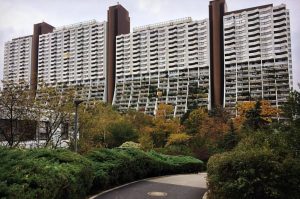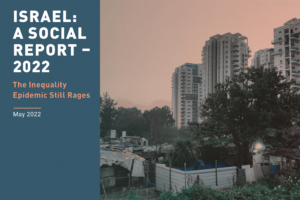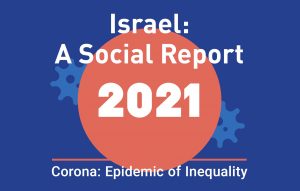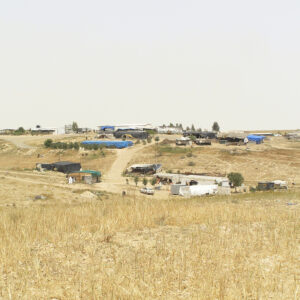This policy document examines the possibilities of implementing “housing for all” in Israel, by means of comparison with and learning from the policy of universal housing in Vienna, the capital of Austria
In Israel today, housing has become real estate investments, in which the mechanisms of allotment and price are determined by “market forces.” Among these forces are wealthy households and financial corporations, which purchase expensive apartments for both residential use and investment; banks and financial entities, which provide credit to apartment purchasers and real estate corporations; and real estate entrepreneurs and other professionals whose income is based on intensive economic activity in the housing market.
The “private market” policy in housing in Israel exacerbates existing socio-economic disparities, as a growing stratum of the population continues to experience difficulty in obtaining “a decent apartment at reasonable cost,” a goal defined in the vision of Israel’s Ministry of Construction and Housing.[1]
As part of the “private market” policy dominating the area of housing for the last few decades, the government of Israel abandoned public housing, made the criteria for entitlement stricter, and reduced or ended completely its investment in the construction of new public housing. In recent years, rent assistance has become the main policy channel in the area of housing – a channel which suffers from numerous problems, is not budgeted in accordance with need, and worst of all – does not fulfill its own aim of providing assistance for the acquisition of a stable roof over one’s head.
The continuation of the housing crisis, which has an adverse effect on a good part of the Israeli population, remains on the public agenda in Israel, with, for the time being, no response. As long as government policy is dominated by the ideology of “the private market,” the vision which still serves as the slogan of the Ministry of Construction and Housing – “a decent apartment for every family at reasonable cost and in suitable neighborhoods” – will remain an empty phrase.
Between 2015 and 2017 the Adva Center published a series of studies on the housing crisis in Israel. The studies dealt with the increase of economic inequality and the implications of the amassing of wealth in the hands of few on the housing market, with the political economy of the housing market and the effect of “market forces” on that market, and with the development of desirable alternative directions, under the rubric of “universal public housing.”
In November 2020, the Adva Center published an additional paper, entitled “Housing for All: Outline for Post-Capitalist Housing Policy in Israel.” The paper was written in the framework of a workshop on post-capitalist thought and action on the part of civil society that took place at the Van Leer Institute between March and October 2020.
The paper suggested a policy whose purpose was to enervate the status of housing as merchandise, weaken the connection between economic status and locality and quality of residence, and guarantee high-quality and suitable housing for all segments of the population. Under such a policy, a residential apartment would cease to constitute real estate merchandise, planned, financed, built and sold in the market for the purpose of investment and maximization of profit; instead, apartments for residence would be constructed as a universal public service, available and accessible to all, just like public education and health services.
The present document is a continuation of the previous one and was also written with the support of the Van Leer Institute. Its purpose is to examine the possibilities of implementing “housing for all” in Israel, by means of comparison with and learning from the policy of universal housing in Vienna, the capital of Austria.
Vienna’s housing policy was chosen as an example of best practice for promoting Housing for All. In the city of Vienna, public and social housing arrangements are salient; they aim to guarantee the right to quality housing in the city for all segments of the population. The literature considers this policy an expression of the implementation of the idea of a “just city”;[10] it is also perceived as a policy that promotes gender equality, as its very creation involved gender mainstreaming .
As will be delineated in the document, this policy is based mainly on a large part of housing being handled “outside the market,” not for the purpose of profit, and whose price is not determined by the mechanism of supply and demand.
Part one of the document presents a short review of the present policy in Israel whose aim is the promotion of discounted housing, long-term rental, and public housing. Part two presents in detail the principles of housing policy in Vienna which aim to guarantee the possibility of living in the city for all segments of the population.
Inspired by the principles of housing policy in Vienna, part three of the document presents the central changes that need to take place in order to promote “housing for all” in Israel, as well as the challenges and impediments that need to be overcome if such a policy is to be pursued. Below is an outline of those changes:
- To make the decision to embark upon an extensive policy of “housing for all.”
- To challenge the central place of the model of private ownership in housing policy.
- To significantly increase the budget for public housing and to change its method of allotment.
- To create mechanisms for long-term rental housing, not for profit and with no time limits.
- To cease to perceive land as a source of revenues, and to allot designated land to low-rent housing.
- To rein in real estate investors and to establish regulatory mechanisms for the private rental market.
- To act to reduce socio-economic inequality.
The aim of the policy promoted by this document is a situation in which every resident of Israel benefits from access to stable, quality housing, and at the same time, maximum freedom to choose where to live, without having their future burdened by heavy debt and huge expenses.
// The project was supported by the Van Leer Institute in Israel // The document was published with the support of the Austrian Cultural Forum, Embassy of Austria, Tel Aviv





